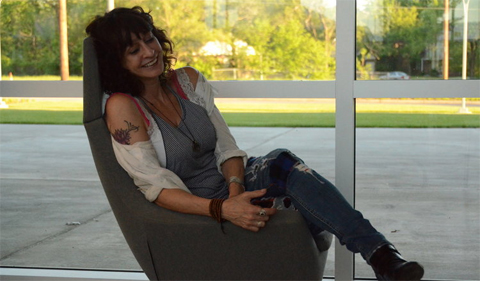The English Department presents Visiting Poet Natalie Diaz on Thursday, Sept. 20, at 730 p.m. in the Walter Hall Rotunda.
A short review of Diaz’s first book is excerpted below:
When My Brother Was an Aztec by Natalie Diaz
An Appreciation, by Seth Foerstner
In her first collection of poems, When My Brother Was an Aztec, Natalie Diaz opens a door for her readers, revealing a world that is too often hidden from view. Diaz was born and raised in the Fort Mojave Indian Village in Needles, California. Her formative years spent on the reservation provide some of the backdrop for this poignant, and often heart-wrenching collection of poems. Diaz’s vivid imagery and unwavering attention to the human condition allows the reader to be deeply affected by the speaker’s meditations on complex family dynamics, a family that has been ravaged by poverty and addiction. In “Downhill Triolets” Diaz writes, “My brother is arrested again and again. And again / our dad, our Sisyphus, pushes his old blue heart up to the station.” Here, the reader can understand the pain that often seeps from Diaz’s verses.
But this is also a vibrant book, and many poems in it are bursting with imagery and magical realism: “He thought he was / Huitzilopochtli, a god, half-man half-hummingbird. My parents / at his feet, wrecked honeysuckles, he lowered his swordlike mouth, / gorged on them, draining color until their eyebrows whitened.” Others, like “Cloud Watching,” address historical atrocities and the way we view them: “Betsy Ross needled hot stars to Mr. Washington’s bedspread— / they weren’t hers to give. So, when the cavalry came, / we ate their horses. Then, unfortunately, our bellies were filled / with bullet holes.”
However, Diaz is not a poet of despair. Though her poems may often touch on pain and suffering, she also explores the forces that bind us all together. In a recent interview with Kenyon Review, Diaz described the urgencies of life that she is compelled by, and which power her poetry:
The body is urgent. The neuropathy in my mother’s feet, the press of my lover’s hips, the ache in my jaw after my root canal this morning, the flinch in my student’s mouth when he said his grandmother passed. The urgency is that we are all connected. Our desires to survive. The urgency is that we are all of the same energy, connected. There is a light in me that is a light in you that is the light in a deer or a jaguar—the energy of life. The beautiful urgency of light, like a thread tethered around all of our wrists, making us touch one another, hit one another, beckon one another
These omnipresent lights shine through in Diaz’s exciting poetic debut, When My Brother Was an Aztec.




















Comments